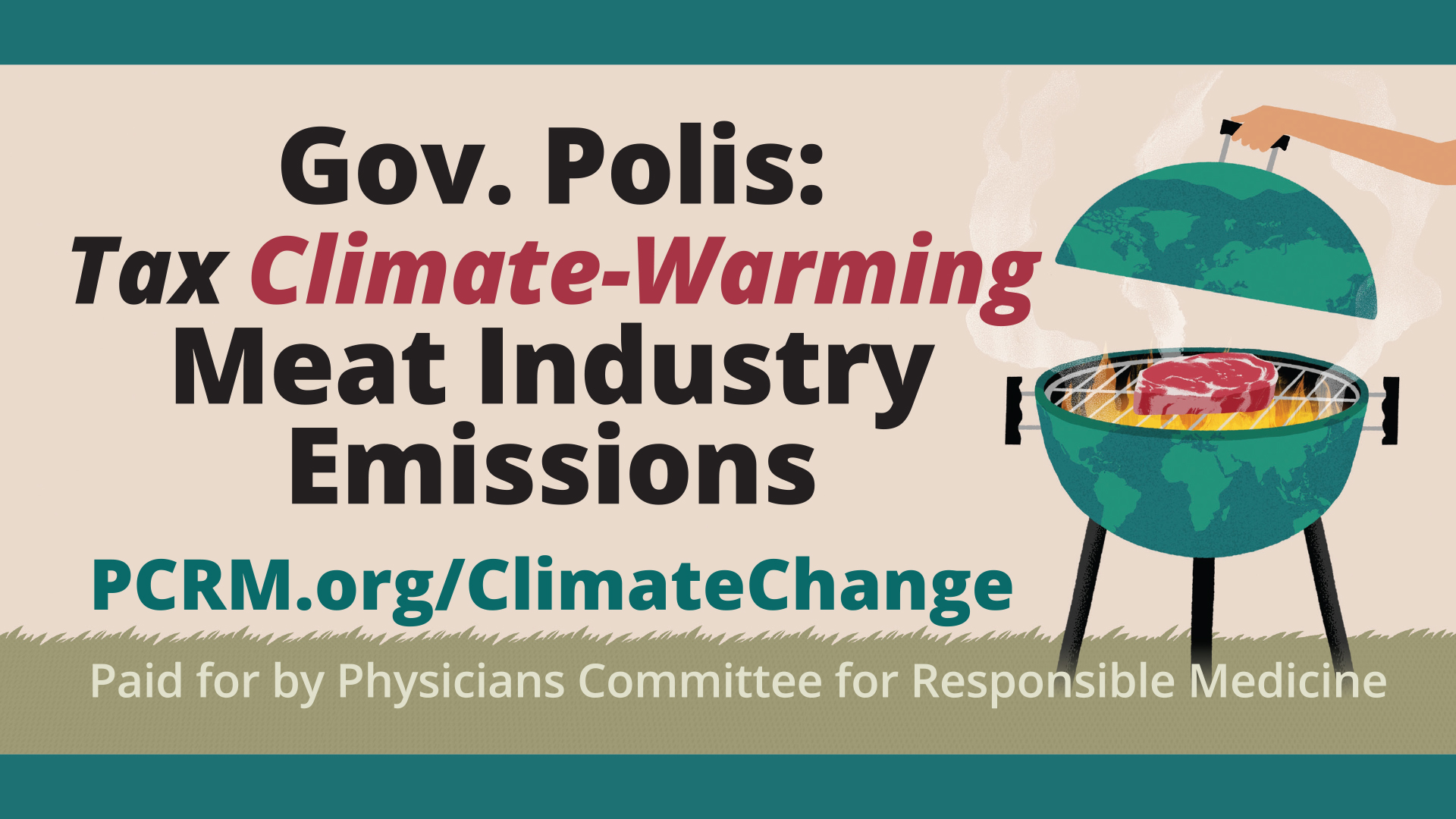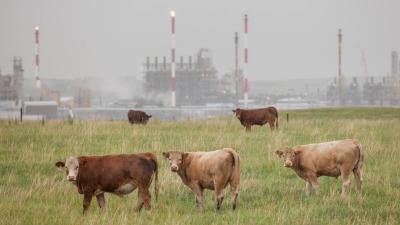A Vegan Diet: Eating for the Environment
A plant-based diet can have a significant positive impact on the environment and your health.
Research shows that meat and dairy products are fueling the climate crisis, while plant-based diets—focused on fruits, vegetables, grains, and beans—help protect the planet.
Plant-Based for the Planet
Shifting diets from meat and other animal products to plant-based diets has a high potential for reducing carbon footprints and mitigating climate change, as well as improving human health, according to Climate Change 2022: Mitigation of Climate Change, a report from the United Nations’ Intergovernmental Panel on Climate Change.
The authors of Climate Change 2022 say that studies demonstrate that a shift to plant-based diets rich in pulses, nuts, fruits, and vegetables could lead to substantial reduction of greenhouse gas emissions as compared to current dietary patterns in most industrialized countries. The report says that other co-benefits include lowering the risk of cardiovascular disease, type 2 diabetes, and reducing mortality from diet-related noncommunicable diseases.
A report published in The Lancet in 2019 concluded that a dietary shift toward plant foods and away from animal products is vital for promoting the health of our planet. The report states that projections for the future show that “vegan and vegetarian diets were associated with the greatest reductions in greenhouse-gas emissions.”
A global shift to a plant-based diet could reduce mortality and greenhouse gases caused by food production by 10% and 70%, respectively, by 2050. A report from the United Nations Environment Programme says that “animal products, both meat and dairy, in general require more resources and cause higher emissions than plant-based alternatives.” The World Health Organization says, “Reducing livestock herds would also reduce emissions of methane, which is the second largest contributor to global warming after carbon dioxide.”
Cattle produce methane as part of their normal digestive process, called enteric fermentation. When cows burp the methane is released into the atmosphere. Methane is also produced when animal manure is stored or managed in lagoons or holding tanks, according to the Environmental Protection Agency.
New Zealand recently proposed a tax on cow emissions, which they could reduce the amount of methane New Zealand’s livestock release into the atmosphere by as much as 47% by 2050. The Danish Climate Council, which advises the Danish government, has also recommended imposing a tax of 33% on beef to help the country meet its climate goals. It also recommended that Danes replace two-thirds of their meat intake with vegetables and other plants to fight climate change.
After health, environmental concerns are the next most prominent factor leading to reduced meat consumption, according to a recent Gallup Poll: seven in 10 say concerns about the environment are behind their avoidance of meat.
A study published last year shows just how critical cutting meat production is in reducing greenhouse gas emissions. The study found that 57% of global greenhouse gas emissions from food production come from meat and dairy products. Beef contributes the most global greenhouse gas emissions, according to the study. Just 29% of food-related global greenhouse gas emissions come from plant-based foods.
The methane emissions of five of the largest meat corporations and 10 of the largest dairy corporations—which include JBS, Tyson, and the Dairy Farmers of America—is equal to over 80% of the European Union’s entire methane footprint, according to a report from the Institute for Agriculture and Trade Policy and the Changing Markets Foundation.
Colorado hosts the U.S. headquarters for the international meat corporation JBS, which, globally, has methane emissions that “far outpace” all other meat corporations, according to Institute for Agriculture and Trade Policy.
Swapping beef for beans could help the United States reach targeted greenhouse gas emission reductions, according to one study. Researchers compared simulated net emissions of legume production, subtracted those from average beef production rates, and used U.S. reduction goals for 2020 as a reference. Based on the results, legume substitution could account for 46-74% of the required reductions.
According to one climate change calculator, eating 75 grams of beef—a typical fast-food hamburger—daily for a year contributes greenhouse gas emissions equivalent to driving a car 7,196 miles—that’s crossing the United States about 2.5 times. Compare that to eating 150 grams of beans—about a third of a can—daily for a year, which is equivalent to driving a car 93 miles.
Shifting Subsidies from Animal Products to Plant-Based Foods
Shifting subsidies from animal products to fruits, vegetables, beans, and grains meant for human consumption could help fight climate change and keep people healthy.
The world’s five biggest meat and dairy producers emit more combined greenhouse gases than ExxonMobil, Shell, or BP, the top three oil production companies, according to a report by GRAIN and the Institute for Agriculture and Trade Policy. Researchers tracked greenhouse gas emissions for 35 of the largest producers of beef, pork, poultry, and dairy. The researchers found that the companies’ emissions are reaching dangerous levels due to unregulated growth and governmental subsidies to ensure inexpensive production costs and supplies such as animal grain. The report states that many of the largest meat and dairy producers do not report emissions, and many are increasing production with no efforts in place to reduce their emissions. If production remains unregulated, by 2050, meat and dairy farms will account for 80% of the budgeted greenhouse gas emissions.
Moving away from animal agriculture subsidies is also beneficial for human health. A study conducted by researchers from the Centers for Disease Control and Prevention and Emory University found that “current federal agricultural subsidies focus on financing production of food commodities, a large portion of which are converted into high-fat meat and dairy products” and other items that increase the risk for cardiometabolic risks in American adults.
Plant-Based Dietary Guidelines
Promoting plant-based dietary guidelines is also beneficial for both the health of the planet and people.
A recent analysis of the dietary guidelines of 85 countries, including the United States, found that they could be both healthier and more sustainable. The study concluded that, “Providing clearer advice on limiting in most contexts the consumption of animal source foods, in particular beef and dairy, was found to have the greatest potential for increasing the environmental sustainability of dietary guidelines, whereas increasing the intake of whole grains, fruits and vegetables, nuts and seeds, and legumes, reducing the intake of red and processed meat, and highlighting the importance of attaining balanced energy intake and weight levels were associated with most of the additional health benefits.”
Another study found that the Dietary Guidelines for Americans’ Healthy Vegetarian Dietary Pattern has half the carbon footprint of the Guidelines’ main recommendations. The authors say that the difference is due to the higher quantities of protein and types of protein in the main recommendations. The Healthy Vegetarian Dietary Pattern’s protein group replaces meat, poultry, and seafood with legumes, soy, nuts, and seeds, resulting in half the carbon footprint.
In 2015, the Dietary Guidelines Advisory Committee recommended a shift away from animal products toward plant-based diets for sustainability. The committee stated that “a dietary pattern that is higher in plant-based foods, such as vegetables, fruits, whole grains, legumes, nuts, and seeds, and lower in animal-based foods is more health promoting and is associated with lesser environmental impact (GHG emissions and energy, land, and water use) than is the current average U.S. diet.”
Health Care Professionals Fighting Climate Change
The American Medical Association adopted a policy in June 2022 that declares climate change a public health crisis that threatens the health and well-being of all people.
Eighty-six percent of health care professionals say that they have a responsibility to inform the public about the health effects of climate change, and 90% say that they need to inform policymakers, according to the results of a survey in The Lancet Planetary Health. But 76% of those surveyed say that they need continuing medical education on climate change and health.
The Physicians Committee has free continuing medical education courses available to health care professionals and anyone else who wants to learn more.
Plant-Based Climate Summit
Learn from leading scientists, climate change experts, and plant-powered advocates on how a vegan diet can save the planet.
Share the benefits of a plant-based diet for human health and the health of the planet with your friends and family.
Plant-Based Climate Cookbook
Download our free e-book to learn more about how a plant-based diet helps the environment and get started with healthy, climate-friendly recipes! Fill out the form below and the download link will be delivered to your email inbox.










